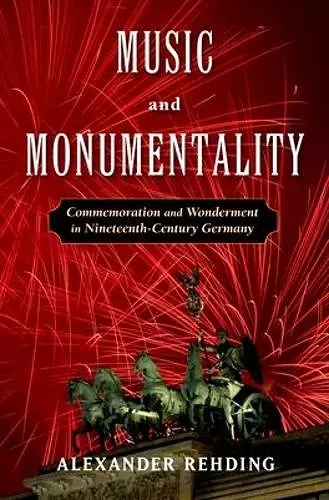Music and Monumentality
Commemoration and Wonderment in Nineteenth Century Germany
Format:Hardback
Publisher:Oxford University Press Inc
Published:20th Aug '09
Currently unavailable, and unfortunately no date known when it will be back
This hardback is available in another edition too:
- Paperback£34.49(9780190656133)

A few weeks after the reunification of Germany, Leonard Bernstein raised his baton above the ruins of the Berlin Wall and conducted a special arrangement of Beethoven's Ninth Symphony. The central statement of the work, that "all men will be brothers," captured the sentiment of those who saw a brighter future for the newly reunited nation. This now-iconic performance is a palpable example of "musical monumentality" - a significant concept which underlies our cultural and ideological understanding of Western art music since the nineteenth-century. Although the concept was first raised in the earliest years of musicological study in the 1930s, a satisfying exploration of the "monumental" in music has not yet been made. Alexander Rehding, one of the brightest young stars in the field, takes on the task in Resounding Monumentality, an elegant, thorough treatment that will serve as a foundation for all future discussion in this area. Rehding sets his focus on the main players of the period within the Austro-German repertoire -Beethoven, Liszt, Wagner, Brahms, Bruckner and Mahler- as he unpacks a two-fold definition of "musical monumentality." In the conventional sense, monumentality is a stylistic property often described as 'grand,' 'uplifting,' and 'sublime' and rife with overpowering brass chorales, sparkling string tremolos, triumphant fanfares, and glorious thematic returns. Yet Rehding sees the monumental in music performing a cultural task as well: it is employed in the service of establishing national identity. Through a clear theoretical lens, Rehding examines how grand sound effects are strategically employed with the view to overwhelming audiences, how supposedly immutable musical halls of fame change over time, how challenging musical works are domesticated, how the highest cultural achievements are presented in immediately consumable form-in a word, how German music emerges as a unified cultural and musical brand.
it does more than simply provide historical background to questions of present-day importance; one of the most impressive features of this book is its multilayered treatment of its topic, constantly using the attitudes and practices of one period to interrogate those of the others ... [this monograph] makes an original and highly stimulating contribution to both musicology and cultural history. * James Garratt, Music and Letters *
ISBN: 9780195385380
Dimensions: 236mm x 163mm x 25mm
Weight: 590g
320 pages